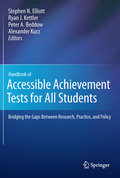
Handbook of accessible achievement tests for all students: bridging the gaps between research, practice, and policy
Elliott, Stephen N.
Kettler, Ryan J.
Beddow, Peter A.
Kurz, Alexander
The Handbook of Accessible Achievement Tests for All Students: Bridging the Gaps Between Research, Practice, and Policy presents a wealth of evidence-basedsolutions designed to move the assessment field beyond “universal” standards and policies toward practices that enhance learning and testing outcomes. Drawing on an extensive research and theoretical base as well as emerging areas ofinterest, the volume focuses on major policy concerns, instructional considerations, and test design issues, including:. The IEP team’s role in sound assessment. The relationships among opportunity to learn, assessment, and learning outcomes. Innovations in computerized testing and the “6D” framework for standard setting. Legal issues in the assessment of special populations. Guidelinesfor linguistically accessible assessments. Evidence-based methods for making item modifications that increase the validity of inferences from test scores. Strategies for writing clearer test items. Methods for including student inputin assessment design. Suggestions for better measurement and tests that are more inclusive. This Handbook is an essential reference for researchers, practitioners, and graduate students in education and allied disciplines, including child and school psychology, social work, special education, learning and measurement, and education policy. Provides comprehensive coverage of the concept of accessibility and its application to the design and use of tests with all students. Covers in depth the topics of test accessibility and test design. Addresses the subject within the context of NCLB, including the modified alternate assessment amendments of April 2007, and item modification research. Details the most current research in testing accommodations, large-scale assessment, and educational accountability. INDICE: Introduction.-Accessible Tests, Inclusive Assessment Systems, & Needed Innovations.-I. Federal Policies & Legal Considerations.-Federal Policiesthat Support Inclusive Assessments.-IEP Team Decision Making for More Inclusive Assessments.-Legal Issues in Testing.-II. Classroom Connections.-Opportunity to Learn What is Tested.-Classroom Learning and Students with Persistent Academic Difficulties.-Instructional Accommodations and Modifications that Support Learning.-Test-wiseness and Test Preparation.-III.Test Design Principles andInnovative Practices for More Accessible Tests.-Validity Evidence for Accommodated and Modified Tests.-Item Writing Research.-Universal Design and Cognitive Load Theories Influence on Item and Test Design.-Testing Accommodations and Item Modifications: Research to Guide Practice.-Students Input: Cognitive Labsand Surveys.-Computerized Tests Sensitive to Individual Needs.-Defining Proficient Performances and Setting Standards.-Conclusions: Accessibility Challenges, Innovative Answers.-Implementing Modified Achievement Tests: Cost. Benefits.-Accessible Tests of Student Achievement: Why now and How.
- ISBN: 978-1-4419-9355-7
- Editorial: Springer New York
- Encuadernacion: Cartoné
- Páginas: 450
- Fecha Publicación: 29/04/2011
- Nº Volúmenes: 1
- Idioma: Inglés
